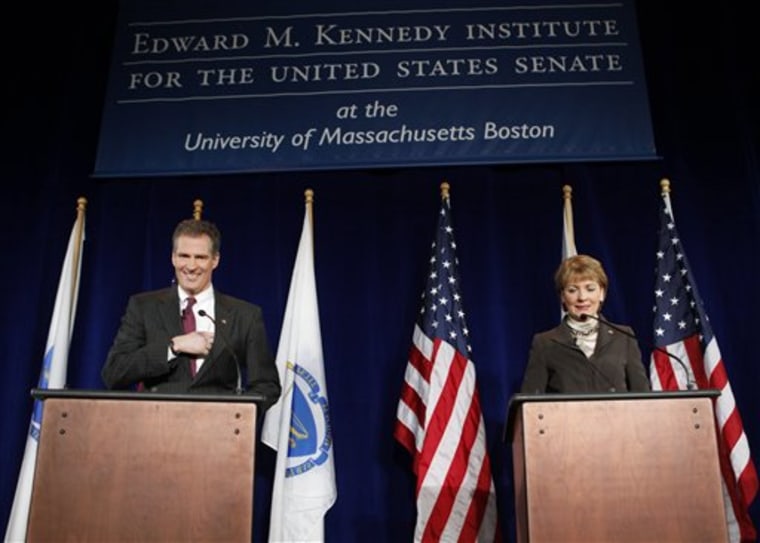The race to succeed the late Sen. Edward M. Kennedy has turned into a proxy battle over the fate of President Barack Obama's health care overhaul.
A once-pedestrian contest between Democrat Martha Coakley and Republican Scott Brown has coarsened with a week to go, as the two have cast themselves as custodians of the pivotal Senate vote to determine the bill's fate.
"As the 41st senator, I can stop it," Brown said last week during a debate, highlighting his potential to be the breakthrough Senate vote that upholds a GOP filibuster. While he opposes the bill, the state senator voted in 2006 in favor of a Massachusetts universal health care bill that has largely been the model for the Obama legislation.
The stakes are so high Democrats won't rule out taking as long as a month to certify the election results — should Brown win — to prevent a Republican from assuming the seat until the Senate completes its work on Kennedy's hallmark legislation.
While the majority of voters in Massachusetts are unenrolled in either major party, there is little empirical evidence to suggest Coakley will lose the special election. The state has a Democratic House and Senate, a Democratic governor and all six constitutional officers — including Coakley, the attorney general — are Democrats, as well.
In particular, Republicans are hoping a closer-than-expected finish would bolster a claim that Democrats are at risk of losing their congressional majorities. Democrats want to protect the president from embarrassment over health care, his top domestic priority.
"The outcome of this race couldn't be more important," Obama himself wrote in a fundraising e-mail Monday night.
Vicki Kennedy, the senator's widow, delivered her own emotional endorsement of Coakley last week. She and four other speakers said electing Coakley was necessary to preserve the crucial 60th Democratic vote that has prevented Republicans from stopping the overhaul bill.
"The choice is very simple," Coakley told the crowd. "With your help and your vote on Jan. 19, we can make Sen. Kennedy's vision of affordable and quality health care for all Americans a reality."
The third candidate, independent Joseph L. Kennedy, has largely been relegated to the sidelines. The Libertarian businessman is not related to the late senator.
Edward Kennedy died Aug. 25 of brain cancer after a nearly 47-year Senate career.
Brown is one of 21 Republican lawmakers in the 200-member Legislature. He is perhaps most widely known for once posing nude in Cosmopolitan magazine, but he also has a sterling resume. It includes 30 years of service in the Army National Guard and stature as the service's top defense lawyer in New England.
"In a country like ours, we should have checks and balances," Joyce Pierangelo, 49, of Wilbraham, said as she held a Brown campaign poster outside the debate.
Brown's supporters have helped create a media frenzy by highlighting a one-day, automated Rasmussen Reports poll showing what they cast as a closer-than-expected race. He also pounded Coakley throughout their final debate on Monday.
Nonetheless, the automated poll showed Coakley leading 50 percent to 41 percent. A more substantive, four-day poll released Sunday by The Boston Globe showed Coakley leading 50 percent to 35 percent.
Rasmussen Reports did work for the Bush-Cheney re-election in 2004.
"Scott Brown has promised to be the one who's going to stop health care, and reforming health care is critical to us," said 63-year-old Ed Collins, a labor official who was among Coakley's debate sign-holders.
The uncertainty is voter turnout for a midwinter election being held the day after a three-day holiday weekend. That has prompted Democratic concerns about the margin of victory that have reached all the way to the White House.
Former President Bill Clinton has been dispatched to headline a Coakley rally on Friday afternoon, and Sen. John Kerry of Massachusetts will break away from his recovery from hip replacement surgery to join him.
Coakley was also making a final fundraising dash to Washington on Tuesday, and the Democratic Senatorial Campaign Committee sent a veteran Massachusetts political operative now living in Washington to help her campaign with its final messaging. She released her first negative ad against Brown on Monday night, hardly a sign of confidence.
"If it's a close race, or the near unimaginable happens — she loses — then make no mistake about it, this becomes the holy grail for the Republicans to flog the Democrats about the 2010 election," Massachusetts Democratic political consultant Mary Ann Marsh said. "Most people from around the country would say, 'Oh, my God, Ted Kennedy's seat, the bluest state in the country, a Democrat barely won.' And that would become a vehicle to raise money and beat up on Democratic members of Congress and the White House."
A local Republican analyst warned against being overly dismissive of Brown's chances, noting recent Republican victories in the New Jersey and Virginia gubernatorial elections.
"I think people who are concerned with what's going on in Washington have found a great candidate in Scott Brown," GOP strategist Charley Manning said. "Scott's clearly on one side of the issues and Martha's on the other, and the issues that really seem to be resonating with the people who are going to vote out in the primary are the ones who are on the same side as Scott."
